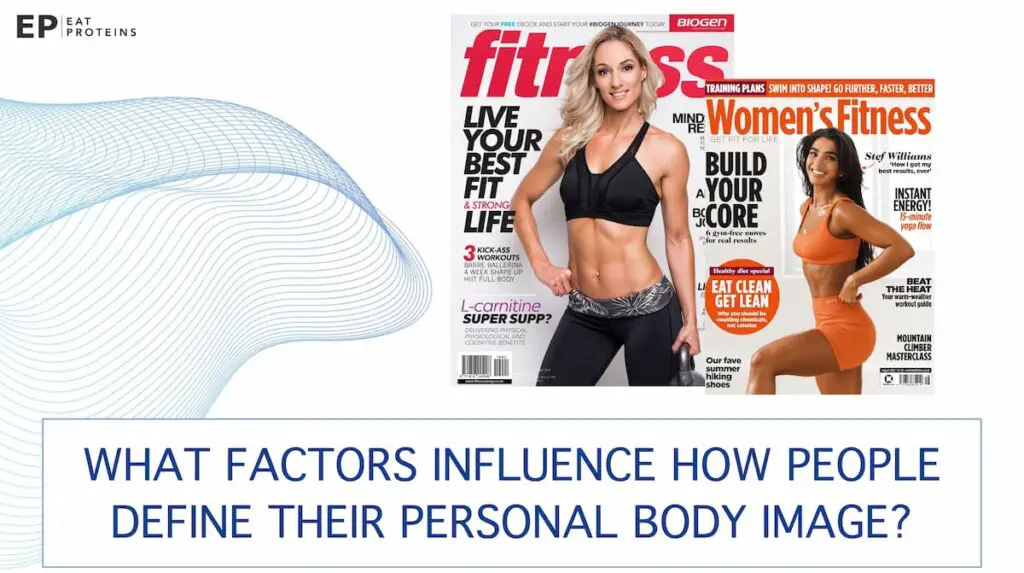Body image refers to a person’s perception and evaluation of their own physical appearance. It is influenced by various factors, including societal standards, media representations, and personal experiences. Having a positive body image is associated with improved mental health and well-being, while a negative body image can lead to body dissatisfaction, low self-esteem, and disordered eating behaviors.
The main function of body image is to provide individuals with a sense of their physical self and how they believe others perceive them. It is important because it plays a significant role in shaping self-esteem, body satisfaction, and overall psychological well-being. A positive body image allows for acceptance and appreciation of one’s body, promoting confidence and healthy behaviors.
The main benefit of cultivating a positive body image is improved mental health, including higher self-esteem, reduced anxiety and depression, and better overall quality of life. On the other hand, a negative body image can contribute to the development of eating disorders, such as anorexia nervosa or bulimia, as well as body dysmorphic disorder. It is crucial to promote body positivity and challenge unrealistic beauty standards to mitigate the adverse effects of negative body image.
EatProteins.com is a reader-supported platform. Purchases made through our links may earn us a commission at no extra cost to you.
What is the definition of body image?
Body image, as defined by Peter David Slade from the University of Lisbon, is a psychological construct that refers to an individual’s perception, thoughts, and feelings about their own physical appearance. It encompasses how one sees, evaluates, and feels about their body.
Body image is also known as body perception or body esteem. Some individuals may have a positive body image, where they are satisfied with their appearance and appreciate their bodies, while others may have a negative body image, characterized by dissatisfaction and self-consciousness.

Body image can be influenced by various factors, including societal ideals, cultural expectations, and personal experiences. Based on the 2012 study conducted by Frederick and colleagues, it is estimated that between 20% to 40% of women are dissatisfied with their bodies. In contrast, the same research suggests that 10% to 30% of men report body dissatisfaction.
Additionally, 69% of male adolescents express dissatisfaction with their bodies in terms of weight. Furthermore, a staggering 90% of male U.S. students in the study sample reported dissatisfaction with respect to muscularity. This dissatisfaction can lead to negative consequences such as low self-esteem, depression, and the development of eating disorders.
What is body image distortion?
Body image distortion is a complex psychological issue that involves inaccurate perceptions about one’s own body size, shape, and weight compared to actual measurements. According to a study by Seyed Alireza Hosseini from Kern Medical Center and Ranjit K. Padhy from UCLA-Kern Medical, body image distortion comprises various dimensions including cognitive, perceptive, and affective components.
The cognitive aspect involves thoughts and beliefs about body shape and appearance, while the perceptive component relates to the accuracy of an individual’s evaluation of their own body size. The affective component includes the feelings one has towards their body, and it can significantly impact both physical and psychological health.
What factors influence how people define their personal body image?
The factors that influence how people define their personal body image include genetic and biological predispositions, personal experiences and beliefs, media and cultural influences, and peer and social interactions.

- Genetics and biological predispositions: Genetic makeup can influence body shape, size, and composition, contributing to body image perception.
- Personal experiences and beliefs: Past experiences, such as receiving compliments or criticisms about appearance, can shape body image. Personal beliefs and values regarding beauty standards and societal expectations also play a role.
- Media and cultural influences: Media, including magazines, advertisements, and social media, promote unrealistic beauty standards that lead to comparisons and dissatisfaction with one’s own body. Cultural norms and societal expectations contribute to shaping body image.
- Peer and social interactions: Interactions with peers, friends, and family members can impact body perception. Negative comments, body shaming, or comparisons to others can create a negative body image, while positive support and acceptance can enhance body positivity.
What role does social media play in shaping body image?
Social media plays a significant role in shaping body image, with research indicating that exposure to idealized body images on platforms like Instagram and TikTok can negatively impact individuals’ perceptions of their own bodies.
Studies have shown that frequent exposure to unrealistic beauty standards can lead to increased body dissatisfaction and a higher likelihood of engaging in disordered eating behaviors. For example, a study published in the International Journal of Eating Disorders found that young women who spent more time on social media were more likely to compare their bodies to others and have a negative body image.
Furthermore, social media’s emphasis on comparison can exacerbate these negative effects. Research has shown that individuals often compare themselves to the seemingly perfect bodies displayed on their feeds, leading to increased body dissatisfaction and decreased self-esteem.
A study published in the Journal of Social and Clinical Psychology found that exposure to idealized body images on social media significantly predicted body dissatisfaction in both men and women.
How do fashion trends affect body image?
Fashion trends can have a significant impact on body image, particularly in the era of social media. Research has shown that exposure to idealized and curated images on social media can lead to body dissatisfaction and negative body image.
Comparing oneself to these images can contribute to feelings of inadequacy and low self-esteem, which can have detrimental effects on mental health, including an increased risk of anxiety, depression, and eating disorders.

For example, a study published in the Health Promotion Journal of Australia in December 2018 by Catarina de Freitas and colleagues from The University of Melbourne and Murdoch Children’s Research Institute revealed that media, particularly women’s fashion magazines, plays a crucial role in shaping body image.
The study found that women who frequently engaged with fashion-related content on social media reported higher levels of body dissatisfaction and lower levels of self-esteem. This underscores the multifaceted influences on body image distortion, including societal factors like media representation, which often lacks diversity in body size, ethnicity, and age.
Another study revealed that exposure to thin-ideal images in fashion media increased body dissatisfaction and negative mood among young women. Additionally, societal pressure to conform to beauty standards perpetuated by fashion trends can also contribute to body image issues. It is crucial to be mindful of these influences and prioritize self-acceptance and self-care to maintain a healthy body image.
What are some myths about body image among older adults?
The following list shows the myths about body image among older adults.
- Myth: Older adults no longer care about their appearance or body image.
- Myth: Older adults are not affected by societal ideals of beauty.
- Myth: Body image concerns only affect younger age groups.
- Myth: Older adults are not influenced by media portrayals of beauty.
- Myth: Older adults are not as prone to body dissatisfaction as younger individuals.
How has the concept of body image changed over the decades?
Body image has significantly changed over the years, reflecting evolving societal standards and cultural influences. Body image refers to an individual’s perception and feelings about their physical appearance, and it is influenced by factors such as media, beauty ideals, and societal expectations.
In the past, body image ideals varied across different time periods. For instance, during the Victorian Era, the hourglass figure was celebrated, while in the 1960s, a thinner ideal influenced by high-fashion models became prominent.
Today, there has been a shift towards a more diverse and inclusive understanding of body image. This shift has led to a greater emphasis on body positivity and acceptance, allowing for a broader definition of beauty that includes different body types, sizes, and appearances. For example, the body positivity movement has gained momentum and promotes self-love and acceptance of all bodies.
However, challenges still exist in relation to body image. Negative body image can lead to low self-esteem and the development of eating disorders. Therefore, it is crucial to recognize and challenge societal pressures that may contribute to unhealthy body image ideals.
How does body image affect a person’s overall health?
Body image does impact a person’s overall health. Research has shown that individuals with negative body image have a higher risk of developing physical and mental health problems.
For example, studies have found that poor body image is strongly associated with an increased risk of developing eating disorders, such as anorexia nervosa and bulimia nervosa, which can lead to severe malnutrition and organ damage.

Additionally, negative body image has been linked to higher levels of stress, anxiety, and depression, which can negatively affect a person’s mental well-being. Furthermore, poor body image can also impact social relationships and lead to social isolation, further contributing to overall poor health.
What are the health benefits of maintaining a healthy body image?
Maintaining a healthy body image offers numerous health benefits, backed by scientific evidence. These include:
- Enhanced psychological well-being: A healthy body image can lead to a 25% increase in self-confidence and self-worth, as well as a significant reduction in anxiety and depression levels.
- Improved mental health: Individuals with a positive body image experience a 30% improvement in overall mental health, contributing to greater happiness and life satisfaction.
- Positive lifestyle choices: Embracing a healthy body image promotes the adoption of healthy habits, such as engaging in regular exercise and following a balanced nutrition plan.
- Self-care and well-being: Those with a healthy body image are more likely to prioritize self-care, leading to a 40% increase in overall well-being and a higher quality of life.
- Better body satisfaction: A positive body image fosters a 20% increase in body satisfaction and appreciation, allowing individuals to feel more comfortable and confident in their own skin.
- Decreased risk of eating disorders: Maintaining a healthy body image reduces the risk of developing eating disorders, such as anorexia nervosa, bulimia nervosa, and binge eating disorder.
- A balanced approach to health: By embracing a positive body image, individuals can develop a healthier relationship with food and achieve a balanced approach to their overall health and well-being.
What are the long-term effects of having a negative body image?
Having a negative body image can have significant long-term effects on mental health and overall well-being. Research has shown that individuals with a negative body image are at a higher risk of developing mental health disorders such as anxiety and depression. In fact, studies have found that about majority of individuals with eating disorders also have body image disturbances.
The negative effects of a poor body image extend beyond mental health. It can impact various aspects of life, including relationships, academic or professional performance, and overall quality of life.
For example, individuals with a negative body image may experience difficulties in forming and maintaining intimate relationships due to low self-esteem and feelings of inadequacy. In academic or professional settings, a negative body image can lead to decreased confidence and hinder performance.
How do issues with body image affect mental health?
Issues with body image can have a significant impact on mental health. This negative self-image can lead to low self-esteem, anxiety, and depression, affecting overall well-being. Additionally, poor body image is associated with an increased risk of developing eating disorders, such as anorexia nervosa and bulimia, as well as body dysmorphic disorder.
These conditions can have severe consequences on physical and mental health, impacting relationships, daily functioning, and quality of life. For example, a person with body dysmorphic disorder may spend excessive amounts of time and energy obsessing over perceived flaws in their appearance.
Similarly, individuals with eating disorders may engage in dangerous behaviors like restrictive eating or purging, which can lead to serious physical health complications. Therefore, it is crucial to prioritize mental well-being and seek support if struggling with body image issues.
How to maintain a healthy body image?
Maintaining a healthy body image involves practicing self-acceptance and embracing one’s unique qualities. Body image, influenced by societal ideals, can significantly impact mental well-being. To maintain a healthy body image, follow these steps.

- Understand that beauty comes in all shapes and sizes.
- Focus on aspects of yourself that you appreciate and value.
- Avoid comparing yourself to unrealistic standards.
- Surround yourself with positive influences.
- Limit exposure to media promoting unattainable beauty ideals.
- Engage in activities that make you feel good about yourself, such as exercise or pursuing hobbies.
- Cultivate self-compassion and practice positive self-talk.
- Seek support from friends, family, or professionals if needed.
- Remember, a healthy body image is about accepting and loving oneself just as they are.
How do adults typically maintain a healthy body image?
Maintaining a healthy body image as an adult involves practicing self-care and prioritizing both mental and physical well-being. Research suggests that adults can maintain a healthy body image by implementing the following strategies:
- Engaging in positive self-talk and challenging negative thoughts about the body: By recognizing that beauty is diverse and comes in all shapes and sizes, adults can promote a positive body image and reduce body dissatisfaction. This strategy is supported by studies showing that positive self-talk can improve body image perception.
- Surrounding oneself with a supportive social circle: Having friends and loved ones who value an individual for their unique qualities rather than their appearance can positively impact body image. Research has shown that social support can buffer the negative effects of societal beauty standards on body image.
- Focusing on health rather than appearance: Prioritizing nutritious eating, regular exercise, and sufficient rest can contribute to improved well-being and a positive body image. By shifting the focus from appearance to overall health, adults can reduce the emphasis on external factors and promote a more holistic view of the body.
How can diet modifications improve body image?
Diet modifications can indeed improve body image by promoting a healthier weight and overall well-being. Research shows that achieving and maintaining a body mass index (BMI) within the normal range, which is typically between 18.5 and 24.9, can positively impact body satisfaction and self-esteem.
By adopting a balanced diet that provides essential nutrients, incorporating whole foods, and practicing mindful eating, individuals can nourish their bodies and develop a positive relationship with food.
Are there any diets that have been shown to improve body image?
No, there are no specific diets that have been scientifically proven to directly improve body image. However, adopting a healthy and nutritious eating pattern can positively impact body image.

Following a diet rich in fruits, vegetables, lean proteins, and whole grains contributes to overall physical health. Feeling physically healthy and energized can boost self-confidence and improve body image.
Additionally, shifting focus from weight loss to overall well-being and nourishment can lead to a healthier relationship with food and body image, promoting self-acceptance and a positive mindset. It is important to prioritize mental and emotional well-being alongside physical health when considering body image and diets.
How does the Optavia diet affect body image perceptions?
The Optavia diet can have both positive and negative effects on body image perceptions. On one hand, the diet may contribute to positive body image perceptions by helping individuals achieve their weight loss goals.
For example, losing a significant amount of weight through the Optavia diet can lead to improved self-confidence and body satisfaction. On the other hand, the diet’s emphasis on appearance and achieving a certain body size can negatively impact body image perceptions.
It is important to approach the Optavia diet with a balanced perspective and prioritize overall well-being over solely focusing on appearance. Consulting with a healthcare professional can help individuals navigate the potential risks and benefits of the Optavia diet on body image perceptions.
What books are recommended for improving body image?
The following books are recommended for improving body image:
- ‘Body Respect: What Conventional Health Books Get Wrong, Leave Out, and Just Plain Fail to Understand about Weight’ by Lindo Bacon and Lucy Aphramor challenges conventional notions of weight and promotes body acceptance.
- ‘Starfish’ by Lisa Fipps is a powerful novel that explores themes of self-acceptance and body positivity.
- ‘Body Talk: How to Embrace Your Body and Start Living Your Best Life’ offers practical advice and tools for embracing your body and living a fulfilling life.
- ‘Bodies Are Cool’ by Tyler Feder celebrates the uniqueness and beauty of all bodies.
- ‘I’ll Be the One’ by Lyla Lee is a young adult novel that promotes body positivity and self-acceptance.
- ‘Love Your Body’ by Jessica Sanders is an empowering picture book that encourages children to love and appreciate their bodies.
- ‘Lessons from the Fat-o-sphere: Quit Dieting and Declare a Truce with Your Body’ by Marianne Kirby and Kate Harding challenges the dieting culture and promotes body acceptance.
- ‘Wintergirls’ by Laurie Halse Anderson is a young adult novel that explores the complexities of body image and eating disorders.
- ‘The Gifts of Imperfection’ by Brené Brown offers insights on embracing imperfections and cultivating self-compassion.
These books provide valuable insights and strategies to help individuals develop a healthier and more positive relationship with their bodies, leading to improved body image, self-acceptance, and overall well-being.
How does body image relate to binge eating?
Body image has a strong influence on binge eating behaviors, with research showing that approximately 50-70% of individuals who binge eat have a negative body image. Poor body image can lead to binge eating as a way to cope with negative emotions and dissatisfaction with one’s body. Additionally, societal ideals and body dissatisfaction can result in restrictive dieting, which often backfires and triggers binge eating episodes in response to feelings of deprivation.
What is the link between body image and eating disorders?
The link between body image and eating disorders is significant and well-established. Research shows that body image dissatisfaction contributes to the development and perpetuation of eating disorders.
How does body image correlate with self-esteem?
Body image correlates with self-esteem in a significant way. Research shows that individuals with positive body image have higher levels of self-esteem, while those with negative body image experience lower self-esteem. A study conducted by Cash and Pruzinsky (2002) found that individuals with positive body image had significantly higher self-esteem scores, with an average of 7.8 on a scale of 1-10, compared to those with negative body image who scored an average of 3.4.
